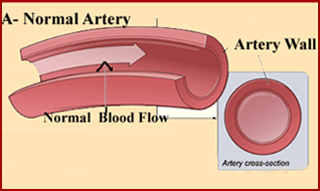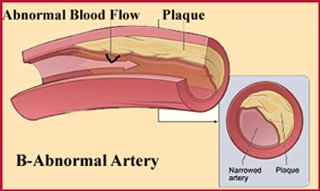Quality Living Styles
Hints and Tips of the Month
Understanding Cholesterol Numbers
Decipher cholesterol test results like these by reading the information that follows.

Know Your LDL and HDL Numbers
Learn the meanings of words like, Cholesterol, LDL, HDL and Triglycerides. Cholesterol tests are very important because they reveal potential risks for heart disease. When you understand the terms and what the tests mean, you can make changes to live a more healthy life.
Cholesterol and triglycerides are two forms of lipid, or fat, that circulate in your bloodstream. They are both necessary for life itself. Cholesterol is necessary for building and maintaining parts of your cells, like cell membranes, and for making several essential hormones.
Triglycerides, which are chains of high-energy fatty acids, provide much of the energy needed for your tissues to function. So you can't live without them.
But when blood levels of cholesterol or triglycerides become too high, your risk of developing cardiovascular disease is significantly increased. And this is why you need to be concerned about your lipid levels.
Low-density lipoproteins -LDL, are composed mainly of cholesterol and have very little protein. They are often referred to as “bad or lousy cholesterol” because they are primarily responsible for depositing cholesterol within arteries.
High-density lipoproteins-HDL, are composed mainly of proteins, with only small amounts of cholesterol. They are often referred to as “good or healthy cholesterol” because they help remove cholesterol from artery walls and transport it to the liver for elimination from the body. Higher HDL levels actually protect against coronary heart disease.
High blood cholesterol is often described as the silent killer as there are no symptoms that indicate high levels. The incidence of heart attacks are increased with higher levels of LDL, “lousy” cholesterol, although other factors such as diet, lack of exercise and genetics do have an impact.
Heart disease is the number one killer of women and men in the United States. Each year, more than a million Americans have heart attacks, and about a half million people die from heart disease.
The Connection Between Cholesterol and Heart Attacks
Arteries are blood vessels that carry oxygen-rich blood to your heart and other parts of your body. If enough blood & oxygen cannot reach the heart & blood supply to a portion of the heart is cut off by a blockage, (plaque), in the arteries, the result is a heart attack. The images below illustrate a blocked artery and an artery that has no blockage, one that we should aim to have.

A normal artery with good clear flow of blood

An artery with poor blood blow due to plaque development
Adults should have a cholesterol test at least once every 5 years. Annual checks are advisable in cases of high cholesterol. The screening test that is usually performed is a blood test called a lipid profile. Fasting for at least 9 hours before the test is recommended.
Results of your blood test will come in the forms of numbers. Here is what you should be looking for:
- Keep LDL level below 100mg/dl
- Keep HDL level at 60, or more than 50mg/dl for women and 40 mg/dl for men
- Keep total cholesterol under 200mg/dl
- Keep Triglyceride levels under 150mg/dl
Please note that the numbers given above are in mg/dl (milligrams/deciliter). If you receive your cholesterol numbers in mmol/l (millimoles/liter), then pay attention to these numbers.
- Total cholesterol readings should be below 5mmol/l
- HDL should be greater than 1,2mmol/l
- LDL should be less than 3mmol/l
A cholesterol reading of over 7mmol/l, could indicate a need for medication and a visit to a doctor
![]()
More About Cholesterol
Cholesterol is not all bad and is actually very useful for our bodies. Amongst several benefits, cholesterol provides a water proof barrier for our skin cells and prevents dehydration. The brain also has high concentrations of cholesterol.
The development of synapses or connections between neurons, is directly dependent on the availability of cholesterol. One of the reasons that sleep is beneficial to our learning and memory is because it enables our brain to make more cholesterol. There are health risks associated with high levels of cholesterol in the blood
Cholesterol is a waxy substance found in the cells of our body, in our blood and in foods we eat. The liver also produces cholesterol. As it does not dissolve in the blood, our bodies have “transportation mechanisms” that carry the cholesterol through the blood stream. These “mechanisms ” are called lipoproteins.
The image below, for illustration purposes, depicts cholesterol being “transported ”in lipoprotein trucks”, in our blood stream.

We will concentrate on 2 lipoproteins, LDL and HDL. Chemical make up of these lipoproteins affect what happens to the cholesterol and its impact on your health.
So What are the Differences between LDL and HDL
- LDL is Low Density Lipoprotein. Dr.Michael F Roizen refers to it as, “Lousy.” It is less dense and it tends to stick to the blood vessels
- HDL is High Density Lipoprotein. Dr.Michael F.Roizen refers to it as, “Healthy.” It is dense.
- An LDL particle is a microscopic blob consisting of an outer rim of lipoprotein surrounding a cholesterol center. While circulating in the blood stream, the chemical makeup is such that it tends to stick to the walls of the arteries.
- To protect the blood vessels, white blood cells swallow and try to digest the LDL. In the process, the white blood cells convert the LDL to a toxic (oxidized) form
- More white blood cells and other cells migrate to the area, creating steady low-grade inflammation in the artery wall
- Over time, more LDL cholesterol and cells collect in the area. The ongoing process creates a bump, or plaque in the artery wall. The plaque is made of cholesterol, cells, & debris
- The process tends to continue growing the plaque, slowly blocking the artery, and limiting the flow of blood, leading to atherosclerosis
- Blood flow to other parts of the body like the brain and limbs can also be affected by plaque in the arteries. This lack of oxygen rich blood flow can result in strokes and carotid artery disease
- An even greater danger than slow blockage is a sudden rupture of the surface of the plaque. A blood clot can form on the ruptured area, causing a heart attack
HDL cholesterol
Experts believe HDL cholesterol may act in helpful ways to reduce the risk for heart disease
- HDL cholesterol scavenges and removes LDL or lousy cholesterol
- HDL reduces, reuses, and recycles LDL cholesterol by transporting it to the liver where it can be reprocessed.
- HDL cholesterol acts as a maintenance crew for the inner walls of blood vessels (endothelium)
- Damage to the endothelium is the first step in the process of atherosclerosis, which causes heart attacks and strokes. HDL chemically scrubs the endothelium clean and keeps it healthy
Can you Lower Your Risks for Heart Attacks
The answer is, yes, in most cases. Your doctor will be the best person to advise you what is best for your circumstances. You may need medication to lower your high levels. Generally a healthy diet and exercise have been found to greatly improve cholesterol numbers. You will find information on the internet and useful recipes at Clever Foods
![]()
For information on other useful numbers for health, check, Blood Pressure
![]()
Sources
Information for this article was obtained from the sources listed below. If you would like more information, please check these links
NHLBI, article on What is Cholesterol?
The images of the normal and abnormal blood flow in arteries was adapted from an image on this site.
Cholesterol levels should be below 5
Real Age: Are You As Young As You Can Be? Michael F. Roizen, M.D.
Thanks to Microsoft Clipart
![]()
If you have any interesting tips to share please email them to 
You may also reach me via my
contact information at
Contact
Now quickly and easily navigate to your next destination.